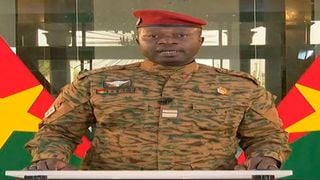
This grab of a handout video released by Radiodiffusion Télévision du Burkina" on January 27, 2022 shows the leader of Burkina Faso's new military junta Paul-Henri Sandaogo Damiba speaking during a televised address, three days after the overthrow of Burkina Faso's president.
| CourtesyAfrica
Premium
Why Francophone West Africa is vulnerable to coups
There was a time Africa used to have at least four coups a year. Between 1960 and 2000, each of Africa’s regions had registered coups and coup attempts. Then they nearly disappeared.
This week, when Lt-Col Sandaogo Damiba, Burkina Faso’s commander of the 3rd Military Region, issued a signed statement saying he had deposed President Roch Kabore, it became the fifth coup in Africa in just under two years.
All of them, except Sudan, have been in the Sahel region of West Africa, creating a notorious trend that had almost disappeared from the continent more than 20 years ago.
There have been 11 successful coups on the continent in the past decade, although there may have been up to 18 attempts.
In Burkina Faso, Lt-Col Damiba loved writing. And even though he had openly criticised the authorities in the past, he was among opponents of a coup plot in 2015 against the same president by supporters of ousted Blaise Campaore.
There were tell-tale signs, though. Last year, a French firm published his book - West African Armies and Terrorism: Uncertain Answers? He spoke his mind, and included the views of his colleagues involved in the fight against insurgency.
Most of the Sahel countries, including Mali, Burkina Faso, Chad and Niger, have faced a relentless onslaught by insurgents, some of whom have morphed into terrorism groups allied to the Islamic State.
These countries, except Niger (where there was a coup attempt last year) have all experienced coups. Chad’s President Idriss Deby died fighting insurgents, but he was quickly replaced by his son, who suspended the constitution.
Under Kabore’s tenure in Burkina Faso, at least 2,000 people were killed by terror merchants, most of them combatants but also civilians.
In the neighbourhood, power has changed hands from civilians to the military in Guinea and Mali. Guinea’s President Alpha Conde had just won an election in October 2020 when he was deposed in October 2021.
In Mali, the military took power twice within one year, having been “dissatisfied” with the transitional government installed after the previous coup. In May 2021, Mali’s coup leader Col Assimi Goïta installed himself as the transitional president.
It is true the region has experienced coups and coup attempts since the 1960s, with only Senegal in the neighbourhood going through its post-independence years without a coup.
Some experts have argued the coups may be a result of the French influence on its former colonies, seeing that nearly all its former territories in Africa have experienced illegal takeovers of power, ostensibly after a stooge had been installed.
France has also maintained security ties with nearly all its former colonies, training its soldiers such as Damiba and Goïta, who were all students in France.
But the current situation is seen as a failure to run free and fair elections. Hassan Sheikh Mohamud, a former president of Somalia who lost to Mohamed Farmaajo in 2017, says coups happen in countries where there is no “election integrity”.
“The military coups in three West African countries is an indicator [of] leadership failure to fix electoral malpractices,” he argued on Wednesday on his Twitter page, using the example in West Africa to warn about his own country, which has struggled to complete indirect elections since last year.
“I urge our leaders, both at national and subnational levels, to take care of the election integrity. The Somali people are watching your behaviour.”
A report by the Council on Foreign Relations, a US think tank, says coups were always waiting to happen in Guinea, Mali and Chad because their leaders had “dubious legitimacy”.
“In Guinea, Mali, and Chad, ruling elites are largely separate or isolated from the people they ostensibly lead,” the CFR said.
“They are widely under siege, with challenges to government authority ranging from radical Islamist reform movements that have widespread popular support to the depredations of Covid-19 to the consequences of climate change.”
Conde, who had become the first democratically elected president in Guinea, chose to run for a controversial third term, aged 83. In Mali’s earlier coup in 2012, Amadou Touré was deposed, having himself come to office through a coup. In 2020, Ibrahim Boubacar Keita was removed from office after failing to address the insurgency question. And in Chad, Deby had won himself a new term after 30 years in office, even as militants gathered against him.
The problem, though, could lie with the international community. The African Union, for example, has a policy not to accept any “unconstitutional changes in government” and routinely suspends members where coups happen. But the bloc hardly intervenes when a leader overstays or runs a rigged election.
In Guinea, both the African Union and the West African bloc Ecowas had sent observers to the October 2020 elections. When opposition leader Cellou Dalein Diallo declared himself winner of the elections whose results had not been announced, he came in for condemnation from the government in Guinea, the electoral commission, and Ecowas and African Union observer groups.
The observers then declared the vote transparent and rejected a unilateral declaration of the results from the opposition candidate, granting Conde a smooth way back into the presidency. But it may have sowed seeds that saw him ousted in September in a military coup that the African Union condemned.
The AU Peace and Security Council condemned the coup, as it did the military takeover in Sudan in October and previous such illegal changes of government across the continent.
But each of those coups in West Africa have received significant support from the public, signalling displeasure with the civilian leaders.





